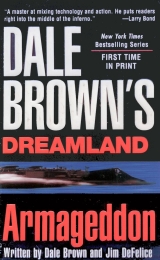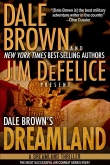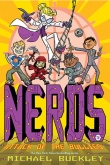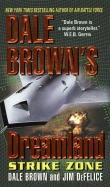
Текст книги "Armageddon"
Автор книги: Dale Brown
Жанр:
Боевики
сообщить о нарушении
Текущая страница: 8 (всего у книги 20 страниц)
Jalan broadcast on the Malaysian air-force frequencies, but got no response.
“They’re sixty seconds from the border,” said Deci.
“There they are!” said Jalan. His voice lost its professional calm and he jerked his hand toward the windscreen, pointing out the window toward the two airplanes, black blurs in the lower left-hand quadrant of the glass. “Motherfuckers.”
It was the first curse—in English at least—Mack had heard from a member of his crew.
“You’re starting to get the hang of this piloting thing, Jalan,” he said. “I’m proud of you.”
“Computer’s optical system confirms they’re carrying bombs beneath their wings,” said Deci. “Something in the 250-pound range”
Mack held to his course to the last possible second, then pulled sharply on the stick, sending the EB-52 into a controlled skid across the sky in front of the two Sukhois.
“Where are we? Our territory or theirs?” he said as gravity slapped his head and chest back against the ejection seat.
“Ours!” managed Jalan.
“Stinger:’ Mack told the computer. “Track one.”
“Target tracked. Target locked,” replied the computer. A bracket had appeared on his HUD, boxing the lead Sukhoi.
“Fire.”
Six airmines flashed from the rear of the Megafortress. The airmines were essentially unaimed canisters of metal shards which exploded behind the rear of the Megafortress, producing a cloud of engine-killing shrapnel. The Malaysian jets, belatedly realizing they were in trouble, dove violently away, then escaped to the north. The computer recorded a minor hit on its target, but not enough to take it down.
“They dropped their bombs in the jungle:’ said Deci. “They definitely missed the border post—they may have landed on in their side of the border.”
“Great,’ said Mack, wrestling his wings level and preparing for the inevitable counterattack. “ECMs. Full suite—play every song in the jukebox.”
The Sukhois’ weapons radars tried desperately to poke through the electronic fuzz kicked out by the Megafortress’s countermeasures. The radar warning detector indicated that the planes were carrying R-27Rs, known to NATO as AA-I0 Alamo-As. These were radar-guided anti-air missiles, efficient killers but easily confused by the Megafortress. One of the Malaysian pilots fired anyway; the ECMs blew out its brain circuitry and sent it sailing off to the west.
Mack cut sharply east then back south, and found himself head-on toward the two jets, only two thousand feet above them and separated by roughly five miles. The position in theory favored the interceptors, who could easily turn and get behind him, where they would be in a good position to fire heat-seeking missiles.
It was what Mack wanted them to do; he intended on suckering one close enough to dish out the airmines as he used flares to knock out the heat-seekers. But they didn’t play along. Instead, one aircraft broke east and began to climb, possibly trying to position himself for a front-quarter attack from above. The other Sukhoi turned and dropped down on the deck.
If Mack wanted to escape, all he had to do was hold the stick steady. But instead he put his wing down, intending at first to tack back west; just as he started to turn he came up with a better idea and rolled the plane into a loop to change direction.
It would have been a great idea if he had been flying an F-22 or F-15, much smaller planes designed to challenge Newton’s laws with some regularity. The Megafortress reacted by pushing her nose sideways and drooping her Y-shaped tail. The spine of the aircraft began to bend, and the computer belatedly screamed at its pilot for exceeding all reasonable bounds of stress and strain. Mack could feel the pressure himself—his head felt as if it were being pummeled from every direction. He managed to. get the aircraft upright and straighten her wings—just in time to narrowly miss getting clipped by the thoroughly confused Sukhoi pilot, who sailed over his wing.
“Stinger. Track one. Fire when locked.”
“Target tracked. Target locked,” replied the computer. “Firing.”
Mack had no time to check this barrage—the second Sukhoi was diving on his tail from four miles.
“Minister—”
“I see him, Jalan. Relax. Stinger. Track.” Mack pointed at the touchscreen where the plane was painted by the EB-52’s radar.
The computer replied that it was out of range.
“Stay with him, baby,” Mack said.
The computer complained that it did not understand the command.
“Range, three miles,” said Jalan. “He’s launching missiles.”
“Flares,” said Mack calmly.
“Target tracked. Target locked,” said the computer.
“Fire.”
As the airmines dished out behind them, Mack pushed hard on the stick, initiating a series of hard zigs to avoid the missile that had just been launched. It turned out to be unnecessary—one of the airmines immolated the missile. The Sukhoi, unscathed, broke off.
“Enemy is accelerating north,” said Jalan.
“He’s going to run out of fuel,” said Mack. “Let’s encourage that.” He twisted around to follow.
THE HELICOPTERS WERE SA 330 F PUMAS, FRENCH-MADE military helicopters that could carry sixteen troops as well as weapons to support them. The helicopters were unloading men via ropes as McKenna approached in her Dragonfly; they refused to answer her hails.
They were also clearly in Brunei territory.
“Mine’s the one on the right,” she told her wingman. “Shouldn’t we consult with the minister before opening the engagement?” replied Captain Yayasan.
“He’s busy,” said McKenna as she swooped into the attack. The Cessna’s sturdy frame shrugged off the four and a half Gs she threw at it, twisting into a dive that put its nose head-on for the side of the lead chopper. The Dragonfly’s nose gun was aimed through an optical sight; McKenna leaned forward and tilted her head, steadying her focus as she moved her plane into the sweet spot of her target. She juiced the trigger and a stream of 7.62-millimeter shells flew from the minigun.
The first wave of bullets spit downward and to the left of the helicopter. McKenna eased the pressure on her stick and fired again, managing to get a few dozen rounds into the lower portion of the helicopter’s fuselage before losing her angle on the chopper. She stomped the throttle and roared overhead, spinning on her wing as she angled for a second approach.
The helicopter shot upward, jinking back and forth as it tried to get away. McKenna couldn’t line up her plane quickly enough for another shot as she crossed back. She growled at herself, slapping her knee as if she were an animal that had tried to enter the wrong paddock on her family’s farm. She took this turn wider, coming around a bit more slowly and more consciously taking her time, aware of the adrenaline rush threatening to scramble her brain. She angled slightly to the right of the helo and about two thousand feet above it as it skimmed down close to the vegetation, desperate to get away. McKenna tilted her body with the plane’s and gave the gun a tentative tickle. She had the range down; as the first bullets sailed into the rotor she stomped her rudder pedal and nailed the trigger down, walking a stream of lead back and forth across the engine housing. Wisps of black smoke appeared at the side, but the helicopter did not go down.
“Dragon Two, how are you coming with that helicopter?” she asked her wingmate, climbing over Malaysian territory. She banked around for another run on the helicopter, figuring it would take one more pass to put it down; the 7.62-millimeter gun in the Dragonfly’s nose was a very light weapon by aircraft standards, and while being on the receiving end was no fun, its bullets did not have the sheer oomph of larger weapons like the twenty-millimeter and thirty-millimeter cannons carried by most frontline interceptors. But the helicopter had begun a hard tilt to the left, its tail rising. It flew onward for a few hundred meters, a duck winged by a hunter’s shotgun shell. Then it plunged into the hillside, flames erupting in a stream behind it.
“Two, what are we doing?” McKenna barked as she started south. She saw the other Dragonfly about a mile and a half away, on her left, above her by at least three thousand feet. She leveled out, not sure of the situation.
“Two? Two?” she snapped.
When her wingman still didn’t respond, McKenna began to fear that he had been hit. She had already started in his direction when she saw the shadow of a helicopter fleeing to her right. Cursing, she turned to pursue, but the helicopter had jinked down and managed to get behind a row of trees. By the time she finally saw it, it was scooting past a small town, flying deep into Malaysian territory. As McKenna checked her position in the sky she saw puffs of black cotton swirling off her left wing and realized for the first time that she was being fired at.
Time to call it a day.
“Two, what’s your situation? Please advise,” she said.
McKenna did a quick instrument check, knowing her fuel was getting low—it was actually a bit better than she thought, not quite hitting her reserves.
“Two? Is your radio out or what?” asked McKenna again. “Two,” said the other pilot finally. She could see Yayasan’s aircraft, well over hers and a tiny black dot in the sky.
“Were you hit?”
“Negative.”
While McKenna was sincerely concerned for the safety of her fellow pilots, and especially those on her wing, that wasn’t the best response, given the circumstances.
“Get back to the airbase,” she told him.
“Two,” he said, wisely guessing there was no sense in doing anything more than acknowledging.
MACK HAD NO HOPE OF KEEPING UP WITH THE SUKHOIS AS they pumped dinosaurs into their afterburners. The dual Saturn Al-31 FMs pumped out over thirty thousand pounds of thrust, taking the Sukhois up over Mach 2, at least for a brief moment.
Mack plotted a course toward the area where he thought their airfield was. But as he started to pursue, the ground controller relayed a request from the police for assistance at Badas, a small city in the south-central portion of the country. They claimed they were under attack by helicopters.
“Not on our screen,” said Deci.
Nonetheless, Mack felt obligated to check it out at close range. They overflew Badas, taking a pass below a thousand feet. Whether that had any effect or not, the police reported that the attackers had fled.
A few minutes later, another request came from the authorities in Muara, north of the capital. Mack directed his second flight of Dragonflies into the area, orbiting with the Megafortress overhead. But even the low-flying A-37Bs couldn’t be of much help as the situation unfolded; two terrorists were holed up in a residential area at the eastern end of the city. After a thirty-minute gun battle, the men immolated themselves, destroying the shanty they had holed up in as well as the two on either side.
With the Sukhois gone for the moment and no fresh helicopter attacks—real or bogus—reported, Mack decided to take the opportunity to refuel the Megafortress and give the crew a rest. He also wanted to see if he could come up with some air-to-air missiles for the aircraft, and needed to check on the Dragonfly pilots.
Mack had Jalan land; the copilot came in a little fast, but the vast runway gave him plenty of margin for error. All in all, the crew had performed pretty well, and Mack made sure to give them attaboys as they shut down. He unsnapped his restraints and went down to the runway, planning to change and then shoot over to the tactical center at the tower.
Prince bin Awg’s car was sitting in front of the hangar. Mack walked over to the car, but instead of the prince he found a staff member from the central defense ministry.
“Prince bin Awg needs to see you right away,” said the man. “I’ll be right with him once I get out of these duds and check with my people,” said Mack.
“The prince’s orders were to bring you directly to town”
“Yeah, very good,” said Mack, starting to walk away.
The aide got out of the car. He was about six-two, with shoulders that looked like they could bounce a cement truck. “The prince gave his orders,” said the man.
“No shit,” said Mack, annoyed. “Have a seat, asshole, I’ll be right with you”
Two of Mack’s security people came out from the hangar. Maybe because of that, the aide stayed back by the car. Meanwhile, Mack went into the life-support shop, a small area at the side used for maintaining and changing into flight gear. The two women in charge of the shop began clucking at Mack as soon as he walked in.
“One at a time,” said Mack. He had trouble with their accents when they weren’t excited.
“Miss McKenna under arrest,” blurted one of the women. “They took her away.”
“What?”
The women explained that six soldiers had come to the gate demanding to see McKenna soon after she landed; mindful of his orders, the security team had denied them access—and then been threatened with being shot. McKenna was called over and apparently agreed to go with the men.
“Why are you saying she was arrested?” asked Mack.
“They said that.”
“The whole world’s gone mad,” said Mack. He left his flight suit on but took a moment to make sure his pistol was loaded. Brown, his maintenance officer, appeared near the doorway.
“Minister, we have difficulties—”
“Can the minister crap and spit it out, Brown,” said Mack. “What’s up?”
“We—our fuel is gone.”
“Send the trucks over to the civilian side of the airport and take what we need,” said Mack.
“But—”
“Give them a chit or whatever paperwork you want. Get the fuel.”
“Yes, sir, Minister.”
“What’s our weapons situation?”
Brown stuttered but managed to report that they had four five-hundred-pound bombs and exactly two dozen smaller 250-pounders, along with some rockets and flares.
“What happened to our request for Sidewinders and AMRAAMs?” Mack asked.
“You made it only last week, Minister.”
“We need those weapons now. Why did they take McKenna?”
“Commodore McKenna? Who took her?” Brown’s face blanched.
“Look, Brown, here’s the situation. Whether the sultan likes it or not, whether Brunei likes it or not, some serious assholes have decided to shoot up the country. I think Malaysia’s helping them. We’re going to need everything and anything we can get our hands on.”
“Yes, sir.”
“Look, if you’re not up to this, you tell me now, because I’m relying on you here,” said Mack. “I need that Megafortress ready to fly as soon as possible. The same with the Dragonflies. Can you do it?”
Brown nodded. “Yes, Minister.”
“They’re trying to take over your country, Brown. I’m telling you. That’s what this is about. We’re not going to let them, right?”
Finally, he’d struck the nerve.
“No, Minister,” said Brown, his face flushing with anger now. “No, we will not.”
“Damn straight, Jack.”
“Damn straight, Jack,” repeated Brown.
Mack almost smiled. Two members of his security team were standing near the aircraft.
“Yo!” he called to them. “Get over here”
The two men, neither older than nineteen, double-timed across the concrete.
“You locked and loaded?” Mack asked.
The men looked at each other.
“Jesus, even I know you look at the gun for the answer, not each other, damn it!”
The two men snapped to, holding their rifles at the ready.
“That’s what we want. Come on,” said Mack. “Let’s go see the prince.”
Dreamland
0200
Every fifth weekend, Danny Freah took a turn in the rotation as the duty officer in the Dreamland command center, an important though not exciting responsibility. Not that it was particularly onerous. It entailed staying on base from 4 P.M. Friday afternoon until 8 A.M. the following Monday. He had to periodically check in with the command center, which was a high-tech situation room linked to similar facilities at the various military commands, the Pentagon, and the White House. It also had high-speed satellite links to deployed Dreamland units.
Danny generally spent his time catching up on his official reading and, nearly as important, his sleep, sacking out in one of the small “ready rooms” located off the corridor of the center. The rooms were more like mini-dorm rooms; each had a bunk bed, a small television that had cable TV access, and a computer loaded up with games. Because they were located in a subbasement away from any machinery, the rooms were dark and quiet, and in Danny’s opinion by far the best places to catch real rest on the base.
Assuming no one woke you up.
“Sir!” shouted a voice somewhere in the blackness beyond his dreams. “Sir!”
“Boston, is that you?”
“Sir! An alert from Washington, D.C.”
Danny started to curse and roll out from under the blanket. As he did, the lights snapped on. The room was not locked and the standing orders called for the officer to be awakened personally.
“Center is requesting your presence,” said Boston, much louder than Danny thought necessary.
“Yeah, I’m coming, Sergeant. Relax.”
Danny stood up and pulled on his shirt. He slept in his pants, belt and all; he figured it was easier and saved potential embarrassment when the night people were women, which was occasionally the case.
Danny walked out to the command center, hoping whoever was on duty there had a full pot of coffee going. Unfortunately, that was not the case. He went over to the main communications console, typed in his password, and squinted into the retina scanner. The machine hesitated for a second, and Danny wondered if his fatigue might confuse it.
It didn’t, at least not fatally. The screen blinked, allowing the connection.
“Freah,” said Danny, picking up the secure phone.
“Captain, this is Jed Barclay over at the White House.”
“Jed? What’s up?”
“We’ve been tracking developments at Brunei and the national security advisor was wondering, uh, hoping he could get a direct report from your people there.”
“Right, yeah,” said Danny. “Uh, Breanna Stockard is on her way back to the States.”
“Can you locate her?”
“Yes, sir,” said Danny.
“Are there other personnel there now?”
He thought they had at least one technical expert there. Danny bent to the keyboard of the computer at his right, hunting and pecking his way to the information.
“Deci Gordon. He’s a wizzo—a radar intercept officer who handles the gear in the AWACS versions of the EB-52s,” said Danny. “We had some maintainer types over there until last week,” he added.
“We’d like to talk to anyone who might be able to give us on-the-spot insight,” said Jed.
“Zen was there,” said Danny. “He’s at home right now.”
“I know the number,” said Jed. “Can you get a hold of Mr. Gordon?”
“Will do. And I’ll track down Breanna, if I can.”
“Thanks. We’ll be waiting.”
Bandar Seri Begawan (capital of Brunei)
11 October 1997, 1710
“Mack, I agree this is a difficult situation, but we must use patience.” Prince bin Awg paced the length of his office in the modern-high rise overlooking the bay, the soles of his Italian shoes squeaking softly on the polished marble floor. “But it is a time for diplomacy, a delicate time.”
“Look, Prince, you know airplanes pretty well,” said Mack. “You’ve got a great collection of Cold War hardware over in your hangars. Those aren’t just pretty planes. The Russians and the Americans—the reason there wasn’t a nuclear war was that we were both matching each other. Those were serious war machines, and both sides had to be careful of the other.”
“What’s your point, Mack?” asked the prince.
“It means you have to show your resolve, not just to these terrorist punks, but to the Malaysians.”
“The Malaysians say they weren’t involved,” said bin Awg. “The helicopters were on a routine training mission.”
“Aw, that’s bullshit and you know it. They were clearly in our territory. And their Sukhois would have hit the police station if we didn’t stop them. You have to help me clear the red tape away so we can get missiles to shoot them down,” said Mack. “And we need F-15s. Or something. Hell, I’ll settle for the Sukhois Ivana Keptrova was peddling.”
“The sultan does not want to upset the current equilibrium?’ said bin Awg. “He’s put all our purchases on hold for the time being.”
“He better change his mind damn quick,” said Mack. “Or he’ll be the ex-sultan. Now where’s my pilot?”
“She was taken over to the central ministry to be interviewed. I’m sure she’ll be released after a few hours.”
Mack had already spun around and headed for the door.
“Mack!” said the prince.
Against his better judgment, Mack stopped.
Confusion and fear mixed in equal parts of the prince’s face. Bin Awg had not impressed Mack as a great statesman; it was clear he was used to the finer things in life and was a bit too fond of pleasure to make the personal sacrifices you needed to make to be a great leader, even in peacetime. But neither had he thought he was a coward or fool.
“Mack, listen,” said the prince, his voice firmer than it had been earlier. “I want you to succeed. Take the steps necessary, and I will do what I can. But there are procedures that we all must follow, even myself.”
Mack glanced at bin Awg’s hands, curled together in tight fists. He wants to be brave, Mack thought to himself, and he knows he has to be. But he’s used to having things laid out for him, and letting other people do the dirty work.
At least his heart is in the right place. That’s going to have to be enough.
“Just back me up, okay?” said Mack.
Bin Awg hesitated, then nodded.
“I’ll keep you informed.”
THE FACT THAT MCKENNA WAS AT THE CENTRAL DEFENSE ministry allowed Mack to kill two birds with one stone. He and his two security men, weapons ready, marched up the steps and through the reception area, pausing at the desk where two Brunei policemen looked at them with jaws just about on the floor.
“Your country is under attack,” Mack told them. “And we’re kicking butt to protect it. I need more security people. So if you get tired of this bullshit desk job, you come see me. We’ll pay twice what they pay you here, and you’ll be patriots besides.”
Mack then spun and walked up the grand stairway before either man could manage to gather his wits. He marched to the office of the central minister, in theory his boss; the man was gone for the day.
Just as well, thought Mack, who then proceeded back downstairs, this time to the basement where McKenna was being interviewed about the helicopter incident. As they came down, one of the young men who had been in the lobby began tagging along. Mack looked at him for a moment, saw the man nod, and nodded back.
A guard stood outside the interrogation room. Mack walked up to him.
“Soldier, you’re at war. At a minimum, your sidearm should be ready to be used,” said Mack, pointing at the buttoned holster. “If you want to see real action, you join us at the airport.”
He slapped the door open and walked into the room, where McKenna sat behind a long table across from two white-haired officers.
“About freakin’ time, Mack,” said McKenna, pushing up.
The two officers looked at Mack in disbelief. One of them started to say something, but stopped as Mack’s soldiers came in behind him.
“Come on, McKenna, we got a ton of work to do.” said Mack, spinning around. “Can’t have you lolling around on your pretty butt all day.”
“Pretty butt? I think that’s sexual harassment,” said McKenna, hustling to keep up with him as he strode out of the room.
New Lebanon, Nevada
0400
Though he would have flown past a dozen anti-aircraft batteries in a Sopwith Camel before admitting it, Zen slept very poorly when his wife was away. In fact, he hardly slept at all most nights. He was watching ESPN SportsCenter when the phone rang, and he snagged it on the first ring.
“Yeah?”
“Zen, it’s Jed. Hey, you awake?”
“Well no, I’m sitting here talking to you in my sleep, cousin. What’s the story?”
Jed brought him up to date on the situation in Brunei, where there had been somewhere around a dozen terrorist attacks over the course of the day. Zen flipped over to CNN as they talked, hitting the mute; there was no mention of the attacks.
“I’ll tell you, that place is a lot more dangerous than people think,” Zen told his cousin. “And something’s going on with Malaysia. Bree said they picked up two Sukhois the other day that supposedly don’t exist.”
“Yeah, we’ve been looking into that. We think the Malaysian government may have purchased them from the Ukraine roughly a year ago, then had them shipped into the country. I won’t know for sure for a while.”
“You think they’re working with the terrorists?”
“I don’t know. There’s no evidence. As a fellow member of ASEAN, they should be allies.”
“Being allies hasn’t stopped people from going to war before,” said Zen.
“Agreed. If we had evidence that they were cooperating, we might be able to pressure them to stop.”
Good luck, thought Zen. He glanced over at the clock on the night table, hoping Breanna was long gone from there.
Brunei
1910
The back of Sahurah’s head continued to pound as he got out of the car and walked slowly to the house. The pain had been with him since yesterday evening, a dull throb that receded at times, but never fully lifted.
A woman with her face covered met Sahurah at the door, staring at him a moment before removing the chain to open it fully. She had a machine pistol in her hand, similar to the one Sahurah had given the boy yesterday. Sahurah frowned at the weapon as he passed into the house. Women were useful in some situations, he believed, and certainly the faithful might follow the dictates of the Prophet, but to arm them was close to folly, and to depend on them at a moment of stress surely desperation.
The two young brothers at the end of the foyer, both equipped with AK47s, were much more reassuring. Sahurah recognized one—he had been in the boat for the beach mission—and nodded before passing by them to go upstairs to the room he had been given. Inside, he closed the door and lay down on the wide bed. He spread his arms out as if supplicating the angels for relief of his headache and tried to sink into the mattress beneath his back.
Just as the pain began to ebb, a sharp knock on the door brought it crashing back.
“Commander Sahurah?” said a voice he did not recognize. “Yes.”
“Commander Besar wishes to discuss the day’s events with you”
Sahurah opened his eyes and stared at the ceiling another moment, then closed them again. He pushed his right leg down so that it bent to the floor, and rolled his body to its side, rising like a wounded animal struggling to its feet. He went to the door, and was surprised to see that the messenger was a man nearly three times his age, with hair whiter than bleached cotton.
Sahurah followed him back down the stairs, through a pair of empty rooms, into a hallway that led to a suite at the back of the house. There was a pool and a patio to the left; the old man led him outside through a pair of French doors, gesturing to the semicircle of chairs just beneath the roof.
Besar sat with his back to him, flanked by a pair of women in Western-style bathing suits. The women were of Chinese extraction—no Muslim would dress so outrageously, surely. They sipped from tall glasses of liquor, both of them obviously drunk.
Pain poked into the side of his head, a hot spear breaking through the bone into the soft flesh.
“Commander Sahurah, sit, sit,” said Besar. He gestured and the women rose. Sahurah closed his eyes and they were gone.
“Besar,” he said, still standing where he had been.
“You don’t look well. And yet your operations have had exceptional results. Sit. Sit. Rest yourself.”
Sahurah managed to slide over to a nearby chair. He had the exact opposite opinion of his missions. The attack on the restaurant had killed only a few people, since the boy had not managed to ignite the bomb before being killed. He had helped plan other operations, including two attacks today on police stations that had demolished both buildings, but to take credit for their success when he himself had not expended any effort would be a great sin.
“Relax, my young friend. Relax. Have a drink.” Besar pushed a glass into his hands. Sahurah, suddenly thirsty, brought it to his lips, then smelled the bitterness of the liquid. He threw the glass to the ground.
Besar laughed. “Never to be tempted”
Sahurah’s head pounded or he would have yelled at Besar, who was always playing such tricks. Besar snapped his fingers, and someone walked toward them. Sahurah, his eyes still closed because of the pain, heard liquid being poured.
“Tea only, my friend, iced tea from China. A soothing drink,” said Besar.
Sahurah was not sure whether to trust him or not. He opened his eyes and saw the glass being held out to him. The young man with the glass trembled slightly.
“Is it tea?” Sahurah asked.
“Yes, Commander.”
“I will kill you if it’s not” Sahurah took the glass. It contained only tea.
“You really have to relax,” said Besar. “And remember the teaching—our sins are being cleansed by our actions.”
“Forgiveness is not a license to sin.”
“Life without sin is not possible,” said the other guerilla leader. “We are men, not angels. Even an ayatollah sins. The imam himself is not without fault; he has said so himself. You are not holier than a holy man, are you?”
Sahurah did not answer. Soon this would all be over, he told himself. He would soon receive the order from the imam to join his brothers in heaven. Sahurah prayed for that day; he prayed for release from the throb at the top of his head.
“Five hundred brothers from the Malaysian territory will join us by daybreak,” said Besar. “We will storm the sultan’s palace at eight, after the council arrives.”
“Five hundred?” said Sahurah. The number seemed incredible.
“Too little, you think?” For the first time, Besar’s voice was contrite, even concerned.
“I could do it with twenty,” said Sahurah, who had planned such a mission several months before.
Besar laughed lightly, then reached over and patted his knee. “You are thinking too conservatively now, Sahurah. We have the entire country to take over. Capturing the sultan is a priority.”
“How will we feed five hundred men?”
“From the sultan’s own kitchen,” said Besar, sliding back in his chair.
San Francisco
0430
Dog’s weight against her side felt reassuring, and as she stared into the dimly lit hotel room Jennifer realized she felt safe for the first time in weeks.








